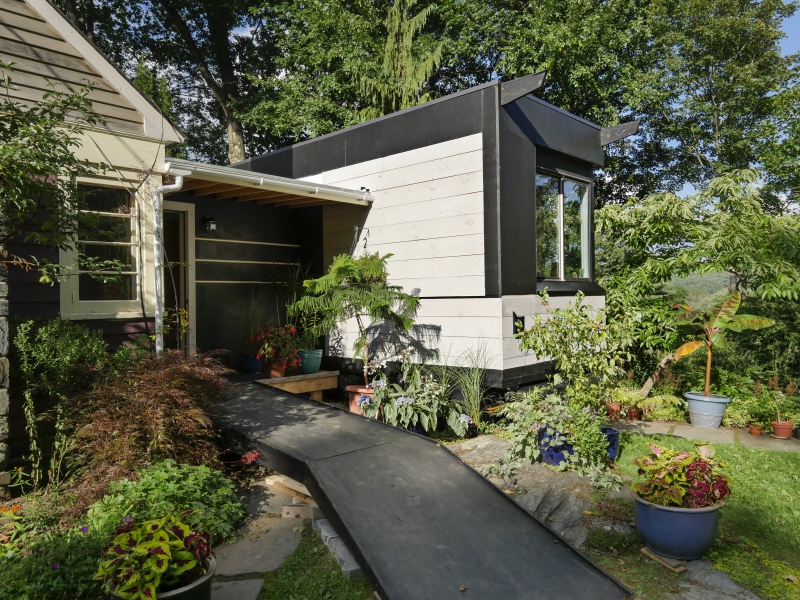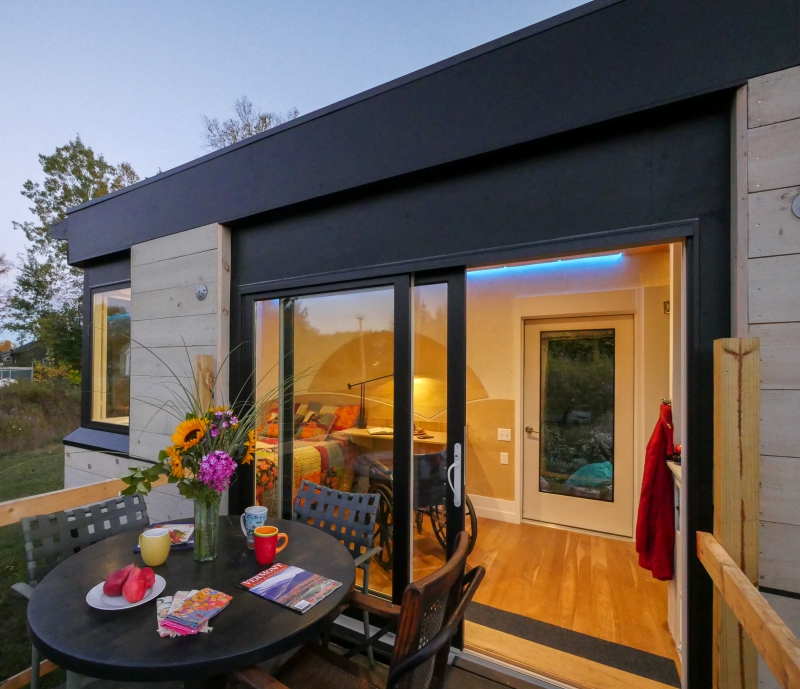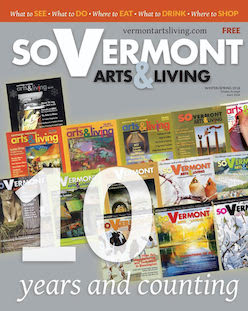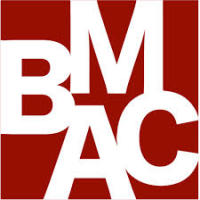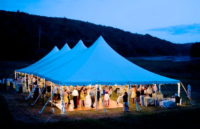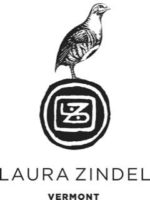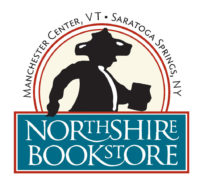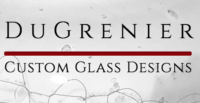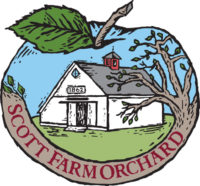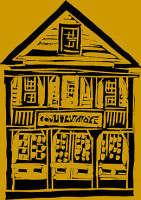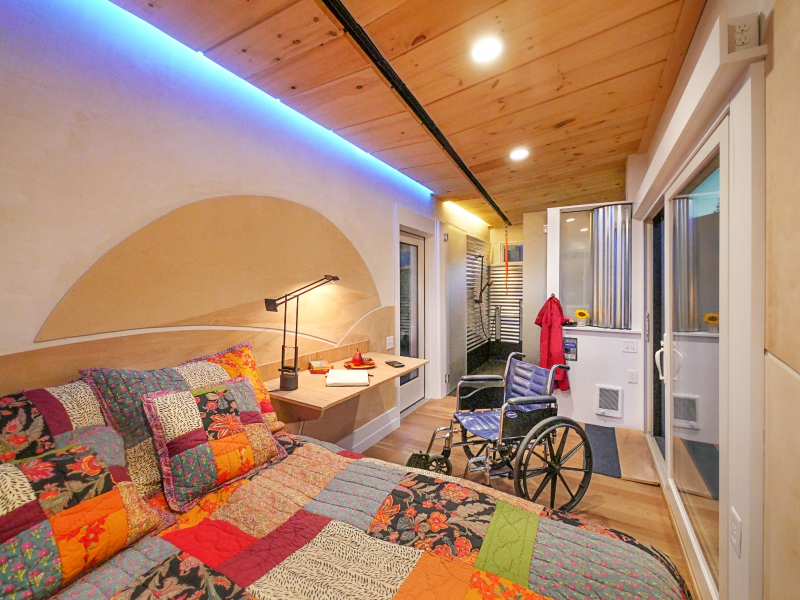
For Cynthia Payne-Meyer of Putney, who now uses a wheelchair as the result of a recent accident, the Wheel Pad offers independence and accessibility in her own home.
By Katherine P. Cox
Joseph Cincotta and Julie Lineberger, the husband and wife team behind LineSync Architecture in Wilmington, prove design can serve a greater good. Their latest innovative venture, Wheel Pad, a 200-square-foot eco-friendly accessible bedroom and bathroom unit on wheels, can attach to a home temporarily.
It’s changing lives for the better. Wheel Pad is a huge boon to people with mobility issues, as it lets them remain in their homes.
“It’s about inclusion,” Lineberger says. “Often, when a family goes through either an illness or a spinal cord injury or the like, the loved one ends up in a nursing facility or a hospital or somehow separated from the family. To me it’s about keeping families together.”
She explains her guiding principle is that “every person has something they can do to leave wherever they are a little better. The combination of my skills in management and organization, and Joseph’s skills as designer and architect, is one way we can do that. He dreams up something and I make it happen.”
Lineberger and Cincotta said Wheel Pad has its origin in a family tragedy. Their godson, Riley Poor, was paralyzed in an accident in 2009. Following six months in rehab facilities, he struggled to find accessible housing.
“If Wheel Pad had been around when Riley came out of rehab, he wouldn’t have been isolated. He would have been with family. He could not find an accessible apartment where a caregiver could have helped him bathe in a shower so he was forced to live in a hotel room for eight months,” Lineberger says.
Poor finally found an accessible apartment, and then a place he wanted to buy. He called Lineberger and Cincotta and asked them to help him make the house universally accessible.
At dinner one night with Poor, Cincotta started brainstorming. He asked Poor, “What if there had been an accessible bedroom and bathroom we could have attached to your mom’s house so you wouldn’t have been isolated for those eight months?”
Cincotta sketched his idea on a napkin, and he and Lineberger spent the rest of the dinner talking about how to make it happen.
Their initial thought was to provide help for those with spine injuries. But they realized possibilities went even further.
Lineberger entered Cincotta’s design in the 2015 Brattleboro Development Credit Corporation/Strolling of the Heifers Business Plan Competition, which is largely funded through the Windham County Economic Development Fund. And Wheel Pad found traction: it was clear it could be used by the elderly, children with cerebral palsy, people who’d lost limbs, and people in hospice.
Lineberger also suggested using Wheel Pad to support intergenerational living, where seniors can stay with their adult children—and have their own entrance—rather than live at a distance in a nursing home. That would make it more convenient for seniors to get to appointments, too, they realized.
The first Wheel Pad, the Norwich model, was built in 2017 with Norwich University engineering and architecture professors and students.
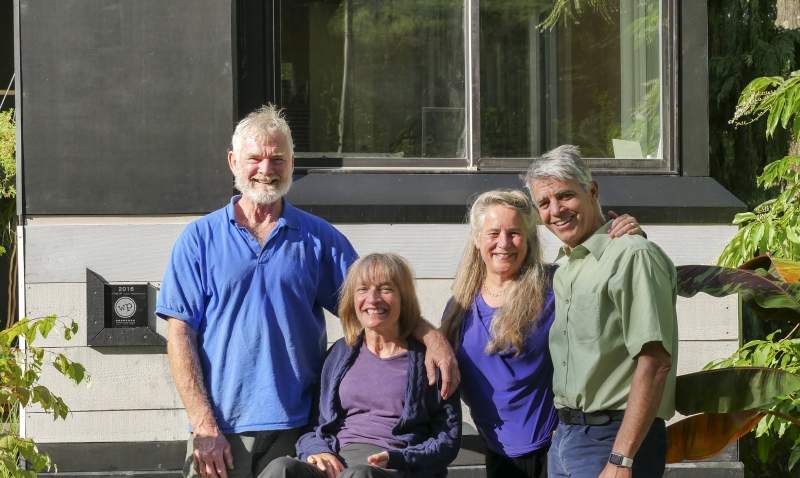
Rod and Cynthia Payne-Meyer, left, are using the first Wheel Pad while they make renovations to accommodate Cynthia’s new mobility needs. With them are Julie Lineberger and Joseph Cincotta, designers of the Wheel Pad.
And the first beneficiary of the Norwich Wheel Pad was Cynthia Payne-Meyer of Putney, who’d broken her neck on vacation in Hawaii. She spent four months in hospitals and rehab centers, but was able to return home to Putney and her family in August 2017.
She credits her return home—and not to a nursing facility—to Wheel Pad.
“My family and I didn’t want me going to a nursing home. So they brought the Wheel Pad here so I could come home.”
Her Wheel Pad is attached to a hallway extending to her family’s living room. Everything is sustainable and toxin free, there’s a non-skid floor, grab bars, a ceiling track for a Hoyer hydraulic patient lift, and a bathroom adapted for those in wheelchairs.
Payne-Meyer describes her Wheel Pad as a warm space and welcome change from sterile hospital rooms. It’s got wood accents on the walls and large windows that let her take in her gardens and the distant hills to the east, providing her views from her bed. An entrance ramp lets her join those gardens when the weather cooperates.
An electric lift attached to the track in the ceiling lifts her from her bed onto her wheelchair and extends to the bathroom, where it can lower her to the shower chair. The open bathroom space includes a sink and toilet. The design is industrial chic, not institutional.
It’s a temporary situation while Payne-Meyer and her husband, Rod, plan renovations to their house. “It’s a whole new option,” Payne-Meyer says.
Lineberger explains that any renovation takes a lot of time and planning. For those dealing with major physical, emotional, and financial life changes, construction disruption can be more than they can handle.
With Wheel Pad, within four days a loved one can have an accessible bedroom and bathroom and access to the common areas of the house. Compare that to six months or longer, with construction mess, the couple says.
When Payne-Meyer is ready to move into her home, this model will be refurbished and available at no charge for six to 18 months for people in financial need, Lineberger says.
In the meantime, another Wheel Pad has been purchased in upstate New York, and three others are being built.
Wheel Pad XL, another Norwich construction, is being developed for Edmond Little, a military veteran in Jericho who has amyotrophic lateral sclerosis (ALS), a group of rare neurological diseases. Little is getting a model that will accommodate a queen-sized bed so he can sleep comfortably with his wife.
VerMod in Wilder, which makes net-zero modular homes, is building the three other units on chassis from Wright Trailers and structurally insulated panels from Foard Panel of West Chesterfield, New Hampshire.
Looking ahead, Lineberger is working with the U.S. Department of Veterans Affairs for a possible larger order of Wheel Pads, with Veterans Service Organizations to get the word out, and to land funding to assist those ineligible for the $77,000 VA Specially Adapted Housing Grant.
“We want to be able to change the way our injured service members come home because many times they’re medically cleared but can’t go home, so they languish in a VA hospital because they don’t have accessible housing,” Lineberger says.
She explains the couple wanted the base model, shipping, building the connector, and putting on a ramp to fit within that grant, and that’s what they’ve managed.
Lineberger is on the board of Vermont Businesses for Social Responsibility and the couple incorporated Wheel Pad as a low-profit limited liability company (L3C), which bridges the gap between non-profit and for-profit investing by providing a structure that facilitates investments in socially beneficial, for-profit ventures by simplifying tax compliance.
“This is meant to be a service and I want it to continue that way,” Lineberger says.
She credits the Small Business Administration’s Small Business Development Center, the Vermont Economic Development Authority, Brattleboro Development Credit Corporation, and Strolling of the Heifers with helping her get Wheel Pad going.
And it’s working. Creativity, social responsibility, and entrepreneurship led to Lineberger being awarded Woman’s Day Magazine and Leading Women Entrepreneurs’ 2017 inaugural SocialPreneur of the Year Award, which shocked her.
“From 1,000 entries, they decided Wheel Pad would be their inaugural winner. From the exposure for Wheel Pad outside Vermont and an article in Woman’s Day, I am receiving three calls a week,” she says.
It’s clear the calls speak to a need, and Cincotta and Lineberger are pleased to do their part.
“Social responsibility is in our DNA. It’s the way we do our life,” Lineberger says.
For more information, visit wheelpad.com.


